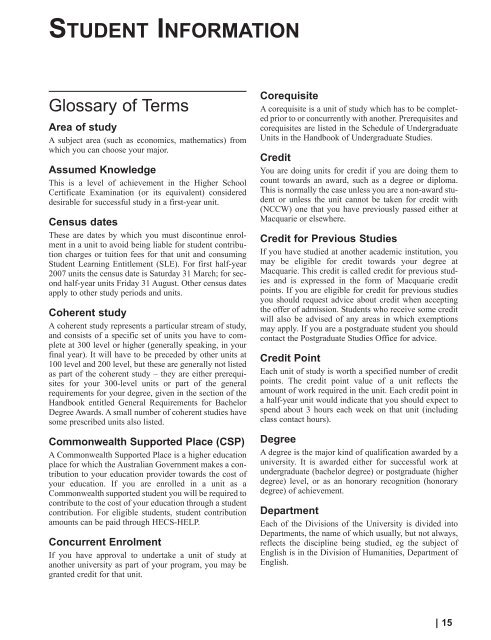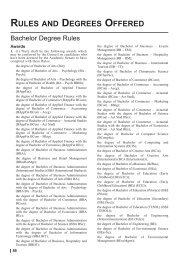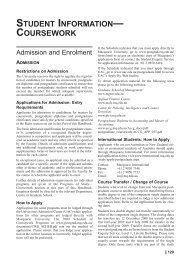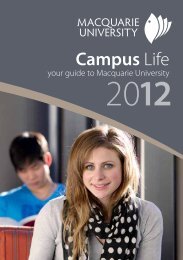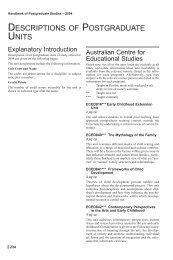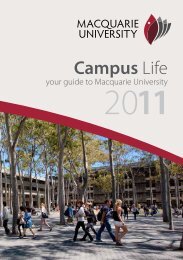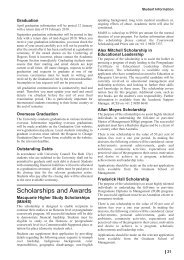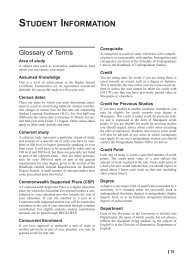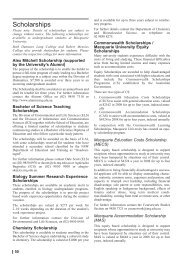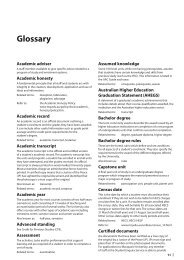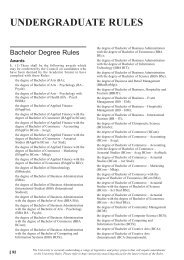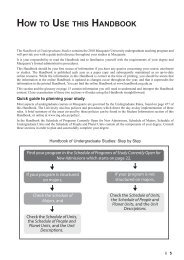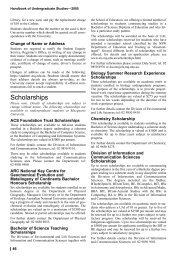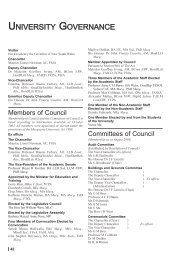Glossary of Terms - Macquarie University Handbooks
Glossary of Terms - Macquarie University Handbooks
Glossary of Terms - Macquarie University Handbooks
You also want an ePaper? Increase the reach of your titles
YUMPU automatically turns print PDFs into web optimized ePapers that Google loves.
STUDENT INFORMATION<br />
<strong>Glossary</strong> <strong>of</strong> <strong>Terms</strong><br />
Area <strong>of</strong> study<br />
A subject area (such as economics, mathematics) from<br />
which you can choose your major.<br />
Assumed Knowledge<br />
This is a level <strong>of</strong> achievement in the Higher School<br />
Certificate Examination (or its equivalent) considered<br />
desirable for successful study in a first-year unit.<br />
Census dates<br />
These are dates by which you must discontinue enrolment<br />
in a unit to avoid being liable for student contribution<br />
charges or tuition fees for that unit and consuming<br />
Student Learning Entitlement (SLE). For first half-year<br />
2007 units the census date is Saturday 31 March; for second<br />
half-year units Friday 31 August. Other census dates<br />
apply to other study periods and units.<br />
Coherent study<br />
A coherent study represents a particular stream <strong>of</strong> study,<br />
and consists <strong>of</strong> a specific set <strong>of</strong> units you have to complete<br />
at 300 level or higher (generally speaking, in your<br />
final year). It will have to be preceded by other units at<br />
100 level and 200 level, but these are generally not listed<br />
as part <strong>of</strong> the coherent study – they are either prerequisites<br />
for your 300-level units or part <strong>of</strong> the general<br />
requirements for your degree, given in the section <strong>of</strong> the<br />
Handbook entitled General Requirements for Bachelor<br />
Degree Awards. A small number <strong>of</strong> coherent studies have<br />
some prescribed units also listed.<br />
Commonwealth Supported Place (CSP)<br />
A Commonwealth Supported Place is a higher education<br />
place for which the Australian Government makes a contribution<br />
to your education provider towards the cost <strong>of</strong><br />
your education. If you are enrolled in a unit as a<br />
Commonwealth supported student you will be required to<br />
contribute to the cost <strong>of</strong> your education through a student<br />
contribution. For eligible students, student contribution<br />
amounts can be paid through HECS-HELP.<br />
Concurrent Enrolment<br />
If you have approval to undertake a unit <strong>of</strong> study at<br />
another university as part <strong>of</strong> your program, you may be<br />
granted credit for that unit.<br />
Corequisite<br />
A corequisite is a unit <strong>of</strong> study which has to be completed<br />
prior to or concurrently with another. Prerequisites and<br />
corequisites are listed in the Schedule <strong>of</strong> Undergraduate<br />
Units in the Handbook <strong>of</strong> Undergraduate Studies.<br />
Credit<br />
You are doing units for credit if you are doing them to<br />
count towards an award, such as a degree or diploma.<br />
This is normally the case unless you are a non-award student<br />
or unless the unit cannot be taken for credit with<br />
(NCCW) one that you have previously passed either at<br />
<strong>Macquarie</strong> or elsewhere.<br />
Credit for Previous Studies<br />
If you have studied at another academic institution, you<br />
may be eligible for credit towards your degree at<br />
<strong>Macquarie</strong>. This credit is called credit for previous studies<br />
and is expressed in the form <strong>of</strong> <strong>Macquarie</strong> credit<br />
points. If you are eligible for credit for previous studies<br />
you should request advice about credit when accepting<br />
the <strong>of</strong>fer <strong>of</strong> admission. Students who receive some credit<br />
will also be advised <strong>of</strong> any areas in which exemptions<br />
may apply. If you are a postgraduate student you should<br />
contact the Postgraduate Studies Office for advice.<br />
Credit Point<br />
Each unit <strong>of</strong> study is worth a specified number <strong>of</strong> credit<br />
points. The credit point value <strong>of</strong> a unit reflects the<br />
amount <strong>of</strong> work required in the unit. Each credit point in<br />
a half-year unit would indicate that you should expect to<br />
spend about 3 hours each week on that unit (including<br />
class contact hours).<br />
Degree<br />
A degree is the major kind <strong>of</strong> qualification awarded by a<br />
university. It is awarded either for successful work at<br />
undergraduate (bachelor degree) or postgraduate (higher<br />
degree) level, or as an honorary recognition (honorary<br />
degree) <strong>of</strong> achievement.<br />
Department<br />
Each <strong>of</strong> the Divisions <strong>of</strong> the <strong>University</strong> is divided into<br />
Departments, the name <strong>of</strong> which usually, but not always,<br />
reflects the discipline being studied, eg the subject <strong>of</strong><br />
English is in the Division <strong>of</strong> Humanities, Department <strong>of</strong><br />
English.<br />
15
Discontinue<br />
If you decide to discontinue, or abandon, your enrolment<br />
in a unit, you must have the change entered on the student<br />
system either via the web or a change <strong>of</strong> program form.<br />
The date by which you do this is important. You must discontinue<br />
by the census date in order to be “not effectively<br />
enrolled” (NE) and to be not liable for student contribution<br />
charges or tuition fees. If you withdraw after the<br />
census date, your <strong>of</strong>ficial transcript will show a Fail<br />
grade for the unit.<br />
Distance Education<br />
Certain units <strong>of</strong> study are <strong>of</strong>fered on a distance education<br />
(or external) basis; these units are identified with an X<br />
code in the Schedule <strong>of</strong> Undergraduate Units. Students<br />
who are otherwise doing their course by internal study<br />
may apply for enrolment in these units (other than law<br />
units).<br />
Division<br />
There are eight Divisions in the <strong>University</strong>. All undergraduate<br />
students will be registered in a Division.<br />
Domestic Fee Paying Place (DFEE)<br />
Fee-paying courses for local students are available for<br />
most undergraduate degrees. For these courses you are<br />
required to meet the full cost <strong>of</strong> your course by paying the<br />
tution fee up-front. You may be eligible for<br />
Commonwealth assistance through the FEE-HELP loan<br />
scheme.<br />
Elective units<br />
Most undergraduate study patterns do not specify all the<br />
units you need to complete to finish your degree; they<br />
allow room for elective units (or electives) to make up<br />
the total number <strong>of</strong> credit points required. You can<br />
choose your elective units from anywhere in the<br />
Schedule <strong>of</strong> Undergraduate Units, so long as you have<br />
the appropriate prerequisites.<br />
Exclusion<br />
Exclusion from the <strong>University</strong> means that you are barred<br />
from re-enrolling for a set period. You may be excluded<br />
for taking an unduly long time to complete your degree,<br />
for failing to pay fees or charges by the due date, or for<br />
disciplinary reasons.<br />
Exemptions<br />
An exemption is a decision made by a member <strong>of</strong> the academic<br />
staff that you may not take a particular unit at<br />
<strong>Macquarie</strong> <strong>University</strong> because you have studied and<br />
passed a similar unit at another institution. These exemptions<br />
are determined on the basis <strong>of</strong> overlap <strong>of</strong> content,<br />
and only apply to students who have been granted credit<br />
from previous studies. The number <strong>of</strong> credit points from<br />
which a student is exempted is related to the amount <strong>of</strong><br />
credit for previous studies given. You will be advised <strong>of</strong><br />
the areas in which exemptions may apply at the same<br />
16<br />
time as credit is notified. If you are exempt from a unit<br />
which is a prerequisite for another unit, you are considered<br />
to have satisfied that prerequisite.<br />
Full-time<br />
You are classified as a full-time undergraduate student if<br />
you are enrolled for the year in 17 or more credit points<br />
for the full year or 9 credit points for the half year, or if,<br />
as a postgraduate student, the total <strong>of</strong> your unit weights is<br />
0.75 or more.<br />
Grade Point Average<br />
Your grade point average (GPA) is a calculation which<br />
reflects the overall quality <strong>of</strong> your grades throughout<br />
your course. It is printed on your academic record; a<br />
grade point average <strong>of</strong> 4, for example, would indicate<br />
that all your grades have been D or HD grades.<br />
Graduand<br />
A graduand is someone who has completed all the<br />
requirements for a degree but who has not yet had the<br />
degree conferred.<br />
Graduate<br />
A graduate is someone who has been awarded a degree.<br />
Graduate diploma<br />
Graduate diplomas are available to students who have<br />
already completed a bachelor degree in any field and who<br />
now wish to complete the equivalent <strong>of</strong> a major study in<br />
another field without attempting a second undergraduate<br />
degree. Graduate diplomas consist wholly <strong>of</strong> undergraduate<br />
units in a particular discipline.<br />
HECS-HELP<br />
HECS — Higher Education Loan Program. The booklet<br />
information for Commonwealth supported students is<br />
available from the Student Enquiry Service.<br />
Intellectual property<br />
Intellectual property is material, research, knowledge or<br />
inventions developed or discovered by staff or by students<br />
as part <strong>of</strong> their studies towards a degree. Any such<br />
material is the property <strong>of</strong> the <strong>University</strong>. If you have a<br />
query regarding intellectual property, you should refer it<br />
to the Research Committee before you begin your<br />
research.<br />
Level<br />
The level at which a unit is taught indicates the amount<br />
<strong>of</strong> prior knowledge required to study it successfully. For<br />
example, 100-level units may be entered in the first year<br />
<strong>of</strong> study and <strong>of</strong>ten do not have any prerequisite units,<br />
while 200-level units generally have 100-level prerequisites.<br />
Major<br />
A major is a structured sequence <strong>of</strong> units, represented
either by a coherent study or by a particular study pattern.<br />
Some majors are represented by only one such program,<br />
others by several.<br />
Misconduct<br />
Misconduct occurs when a student does not follow the<br />
Bylaws or rules set down by the <strong>University</strong>. A student<br />
may be punished for misconduct or breach <strong>of</strong> discipline<br />
by suspension from classes, payment <strong>of</strong> fines, or exclusion<br />
from the <strong>University</strong>.<br />
Mode <strong>of</strong> <strong>of</strong>fering<br />
The mode <strong>of</strong> <strong>of</strong>fering for a unit <strong>of</strong> study indicates<br />
whether it is a day (D or D*), evening (E), distance education<br />
(external) (X), composite mode (n), vacation or<br />
field work (V2) unit, or winter vacation (wv).<br />
NCCW<br />
A unit labelled NCCW may Not Count for Credit With<br />
another specified unit.<br />
Non-award<br />
Non-award enrolment, available in most undergraduate<br />
and some postgraduate units, lets you enrol without<br />
counting those units towards a degree or diploma. It is<br />
not available to you if you are currently enrolled in a<br />
<strong>Macquarie</strong> degree or if you have one partly completed<br />
from a previous enrolment.<br />
Non-degree<br />
Non-degree enrolment is enrolment by a current<br />
<strong>Macquarie</strong> degree student in a unit which will not be<br />
counted for credit towards the degree. Such a unit may be<br />
an NCCW unit.<br />
Not effectively enrolled<br />
You are not effectively enrolled if you withdraw from a<br />
unit before the census date. Your enrolment in that unit<br />
will not be permanently recorded and you will not be<br />
liable for student contribution charges or tuition fees for<br />
that unit or consume any SLE.<br />
Part-time<br />
You are regarded as a part-time undergraduate student if<br />
you are enrolled in fewer than 17 credit points in a year<br />
or less than 9 credit points in a half year, or, as a postgraduate<br />
student, in units with a total weight <strong>of</strong> less than<br />
0.75.<br />
Pass degree<br />
A pass degree is the normal form <strong>of</strong> a bachelor degree or<br />
a master degree, when an honours program has not been<br />
undertaken.<br />
Pink form<br />
The “Application for Special Approval (Waiver)” form is<br />
commonly known as a Pink Form.<br />
Plagiarism<br />
Plagiarism involves using the work <strong>of</strong> another person and<br />
presenting it as one’s own. Any <strong>of</strong> the following acts constitutes<br />
plagiarism unless the source <strong>of</strong> each quotation or<br />
piece <strong>of</strong> borrowed material is clearly acknowledged:<br />
• copying out part(s) <strong>of</strong> any document or audio-visual<br />
material (including computer based material);<br />
• using or extracting another person’s concepts, experimental<br />
results, or conclusions;<br />
• summarising another person’s work;<br />
• in an assignment where there was collaborative<br />
preparatory work, submitting substantially the same<br />
final version <strong>of</strong> any material as another student.<br />
Encouraging or assisting another person to commit plagiarism<br />
is a form <strong>of</strong> improper collusion and may attract<br />
the same penalties which apply to plagiarism.<br />
Practical<br />
Practical work or practical sessions are usually a compulsory<br />
component in the scientific subjects <strong>of</strong> the<br />
<strong>University</strong>. They are <strong>of</strong>ten carried out in a laboratory or<br />
in the field and involve “hands-on” techniques.<br />
Prerequisite<br />
A prerequisite is a unit <strong>of</strong> study which must be completed<br />
or a requirement which must be satisfied before you<br />
enrol in a particular unit. Prerequisites and corequisites<br />
are listed in the Schedule <strong>of</strong> Undergraduate Units.<br />
Prescribed unit<br />
Units which are compulsory for completion <strong>of</strong> a degree<br />
have been specified by the Academic Senate and are<br />
referred to as prescribed units.<br />
Program code<br />
An individual code has been allocated to each Program <strong>of</strong><br />
Study, whether it is a coherent study or a study pattern.<br />
Coherent studies have a code which consists <strong>of</strong> three letters<br />
followed by two numerals (for example, LNG01).<br />
Study patterns have four letters followed by two numerals<br />
(for example. LING01)<br />
Program <strong>of</strong> Study<br />
Your Program <strong>of</strong> Study is the combination <strong>of</strong> units or<br />
research work required to satisfy your major and to<br />
enable you to qualify for the degree for which you are<br />
enrolled. It takes the form <strong>of</strong> a coherent study or a study<br />
pattern.<br />
Remission or re-crediting<br />
A practice where a student's FEE-Help balance or SLE<br />
(including any HECS-HELP debt) is re-credited because<br />
<strong>of</strong> special circumstances.<br />
Schedule <strong>of</strong> Undergraduate Units<br />
The Schedule <strong>of</strong> Undergraduate Units in the<br />
Undergraduate Handbook is the <strong>of</strong>ficial list <strong>of</strong> units<br />
17
<strong>of</strong>fered, specifying time <strong>of</strong> <strong>of</strong>fering, credit points, corequisites<br />
and prerequisites, and so on. The Descriptions <strong>of</strong><br />
Undergraduate Units give more detailed information on<br />
each <strong>of</strong> the units.<br />
Special examination<br />
If you were unable to attend a compulsory examination<br />
because <strong>of</strong> illness or misadventure, you may apply to the<br />
Academic Program Section to sit a special examination at<br />
a later date. The temporary grade awarded is “IS”<br />
(Incomplete - Special Examination).<br />
Student Learning Entitlement (SLE)<br />
An entitlement that gives eligible students access to a<br />
Commonwealth supported place. All eligible students<br />
start with an SLE <strong>of</strong> seven effective full time years.<br />
Study pattern<br />
A study pattern is a particular way <strong>of</strong> representing a<br />
major, which is a structured sequence <strong>of</strong> units taken to<br />
satisfy the relevant degree requirements. It consists <strong>of</strong><br />
core units at each level (unlike a coherency which specifies<br />
only 300-level units) and usually a number <strong>of</strong> elective<br />
units to make up the total number <strong>of</strong> credit points<br />
required for the degree.<br />
Unit <strong>of</strong> study<br />
Your Program <strong>of</strong> Study, whether it is for a degree or<br />
diploma, is made up <strong>of</strong> a number <strong>of</strong> units <strong>of</strong> study (generally<br />
referred to as units, and sometimes informally<br />
called subjects), each worth a fixed number <strong>of</strong> credit<br />
points. For instance, if studying for the Bachelor <strong>of</strong> Arts,<br />
the student must complete units totalling at least 68 credit<br />
points. A unit <strong>of</strong> study may be a half-year or full-year<br />
unit <strong>of</strong> instruction, involving lectures, assignments, practical<br />
sessions and tutorials or on-campus sessions.<br />
Waiver<br />
To seek a waiver <strong>of</strong> prerequisites and corequisites for a<br />
particular unit, students must use the “Application for<br />
Special Approval” form, available at www.reg.mq.edu.au<br />
/Forms/USSWaiver.pdf<br />
Withdrawal Without Penalty (W)<br />
“W” (withdrawal) is a grade given for a unit <strong>of</strong> study<br />
which indicates that you have withdrawn from the unit<br />
without academic penalty and is awarded when a Fail<br />
grade is converted to a W. “W” withdrawn grades are still<br />
a financial liability.<br />
Supplementary Schedule <strong>of</strong> Units<br />
The Supplementary Schedule <strong>of</strong> Units is the list <strong>of</strong> units<br />
<strong>of</strong>fered by other institutions which you may take as part<br />
<strong>of</strong> your degree here.<br />
TEP<br />
Teacher Education Program<br />
Testamur<br />
Your testamur is the <strong>of</strong>ficial document with the<br />
<strong>University</strong>’s seal on it which certifies that you have been<br />
awarded your degree or diploma.<br />
UAC<br />
Universities Admissions Centre.<br />
Unavoidable disruption<br />
Unavoidable disruption is the result <strong>of</strong> a set <strong>of</strong> circumstances<br />
beyond normal expectation and over which you<br />
have no control. Documentary evidence <strong>of</strong> such disruption<br />
or illness may be accepted as reason for withdrawal<br />
from a unit or for the award <strong>of</strong> a special examination.<br />
Unit code<br />
An individual code has been allotted to each unit <strong>of</strong><br />
study. The code is three or four letters to represent the<br />
subject area followed by one digit to represent the level<br />
<strong>of</strong> the unit: 1 = 100 level, 2 = 200 level, 3 = 300 level etc<br />
followed by two further digits to distinguish the particular<br />
unit. For example, the unit code for Bilingualism is<br />
LING312, indicating that it is a Linguistics unit at<br />
300 level.<br />
18


